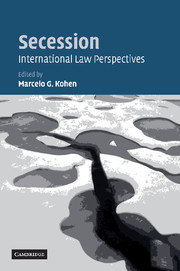Book contents
- Frontmatter
- Contents
- List of contributors
- Preface
- Table of cases
- Table of international instruments
- List of abbreviations
- Introduction
- PART I The Foundations of International Law and Their Impact on Secession
- PART II International and Domestic Practice
- 9 The question of secession in Africa
- 10 International law and secession in the Asia and Pacific regions
- 11 Secession and international law: the European dimension
- 12 Secession and international law: Latin American practice
- 13 Lessons learned from the Quebec Secession Reference before the Supreme Court of Canada
- 14 The Secession of the Canton of Jura in Switzerland
- 15 Conclusions
- Select bibliography
- Index
9 - The question of secession in Africa
Published online by Cambridge University Press: 23 July 2009
- Frontmatter
- Contents
- List of contributors
- Preface
- Table of cases
- Table of international instruments
- List of abbreviations
- Introduction
- PART I The Foundations of International Law and Their Impact on Secession
- PART II International and Domestic Practice
- 9 The question of secession in Africa
- 10 International law and secession in the Asia and Pacific regions
- 11 Secession and international law: the European dimension
- 12 Secession and international law: Latin American practice
- 13 Lessons learned from the Quebec Secession Reference before the Supreme Court of Canada
- 14 The Secession of the Canton of Jura in Switzerland
- 15 Conclusions
- Select bibliography
- Index
Summary
This chapter analyses the current state of the African legal order on the right of peoples to secession. It points out first the huge complexity of this question for African States which, given the arbitrary partition of Africa by colonial powers, are composed of numerous ethnic groups, and in which individuals belonging to a same ethnic group have different nationalities, generally those of neighbouring States. This particular situation has led the Organization of African Unity, and its successor the African Union, not to recognise, as a matter of principle, a right to secession to any African people. This aversion to secession seems to have been reinforced by the new right of the African Union to intervene within a member State to restore peace and stability in the case of a serious threat to the legitimate order of that State.
However, the potentialities offered by the African Charter on Peoples and Human Rights for a right to secession, as a last resort, can not be ignored. On the basis of the right of people to self-determination, the contemporary African legal order has been promoting the respect of internal self-determination, which could be seen as an alternative to secession. This promotion operates through the respect of democratic principles and good governance, and election monitoring and observing, culminating in the rejection and condemnation of unconstitutional changes of government.
- Type
- Chapter
- Information
- SecessionInternational Law Perspectives, pp. 257 - 296Publisher: Cambridge University PressPrint publication year: 2006
- 3
- Cited by

